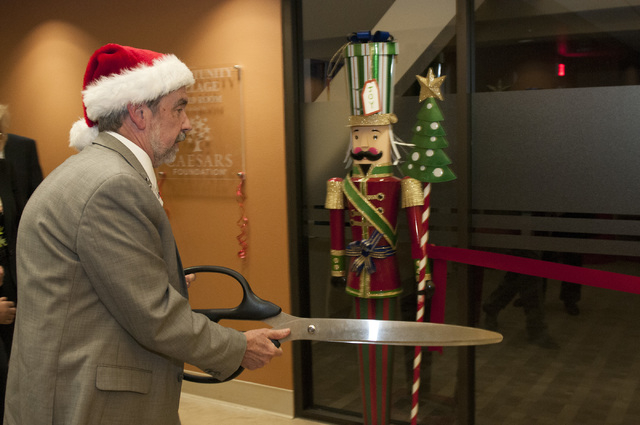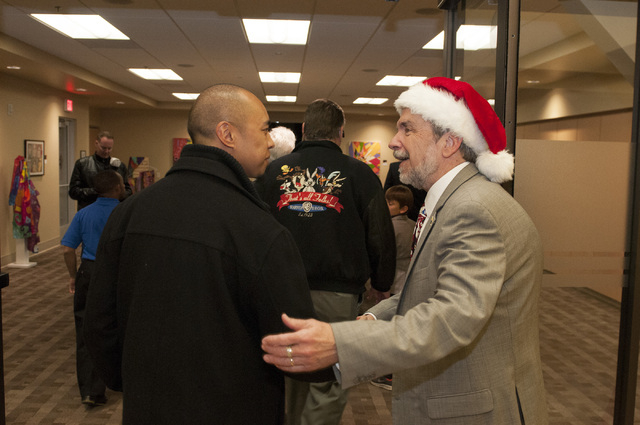Nevada law could help keep tax collector at bay
CARSON CITY — It’s January and time to scrounge through drawers and folders for any receipts or letters that might reduce the taxes you owe to the Internal Revenue Service.
This year, before you send in your tax return, you also might want to visit the Nevada secretary of state’s website, nvsos.gov, and check out the businesses to whom you made donations. There is a search engine midway down the page.
You might find you cannot claim tax deductions on some of those who received your checks.
“A lot of Nevadans assume their donations are tax-deductible because they made them to a nonprofit,” said Nicole Lamboley, the deputy secretary of state. “Just because you gave to a nonprofit does not mean it is tax-deductible.”
Only the IRS can determine whether a nonprofit organization is a charity to which donations are tax-deductible, she said. The IRS audits taxpayers regularly and could require you to refile and reduce the amount you claimed for charitable contributions.
Everyone has heard about 501c nonprofit organizations, but there are more than 30 types of 501cs. Only the 501c (3)s are tax-deductible. The nonprofit must be organized and operated only for charitable, religious, scientific, literary or educational purposes, or for the prevention of cruelty to children or animals. Certain organizations that foster national or international amateur sports competition also qualify.
There are nearly 15,000 nonprofit companies registered in Nevada but about 80 percent are not tax deductible organizations.
Knowing which is which could help keep the tax collectors at bay.
EASIER FOR people to check charities
Through passage of Assembly Bill 60 in 2013, the secretary of state’s office is trying to make life easier for Nevada taxpayers. The bill, introduced in the Assembly Judiciary Committee, was authored by the secretary of state’s office.
Now you can look up organizations on their websites and find out whether any money donated to them can be claimed on your tax return.
You can also find out limited financial information about the charities, their websites, names and addresses of key personnel and a business representative through whom they can be contacted, along with that person’s telephone number. An added feature is whether the organizations have complied with the Patriot Act by not contributing funds to a terrorist organization.
Lamboley said every year her office receives complaining calls from people who were under the impression that their donations were tax-deductible only to learn that was wrong. They might have been misled into thinking they could claim deductions.
“We are a good-natured society,” she said. “We want to help. It happens after every disaster, like Hurricane Katrina. Nonprofit organizations say they will help victims.”
“But there are a lot of scams,” according to Scott Anderson, deputy secretary of state for commercial recordings since 1997.
AB60 passed the state Senate 19-2 and the Assembly 25-15 with every Democrat who voted supporting the bill and every Assembly Republican voting against it.
Still, Gov. Brian Sandoval, a Republican, signed the bill.
Opponents questioned the need for the bill, claiming it duplicated the work of the IRS. Some did not like initial language to allow the secretary of state to conduct audits of the nonprofits, but that was amended out of the bill.
law called ‘UNNECESSARY INTRUSION’
Longtime conservative activist Janine Hansen remains opposed to the new law.
“It bothers me the secretary of state (Ross Miller) feels he has to regulate all our lives,” said Hansen, a longtime anti-abortion legislative lobbyist. “I consider it anti-American. It will reduce volunteerism.”
Hansen said individuals have a responsibility to check out any charity to which they choose to donate money. She said less, not more, government regulations are needed. With too much government oversight, there will be a reluctance by people to donate time to nonprofit organizations.
“We don’t need the secretary of state to consider which (charities) are good and which are not. Whenever you have government with more laws and regulations, you have less freedom.”
“It is another unnecessary intrusion by government, another burden on business,” Hansen said.
She said small charities, such as the one she set up for Eagle Forum, cannot afford to hire lawyers or accountants to comply with added government requirements. Hansen said she closed one charity after the requirements became too difficult to handle.
But Anderson, whose office website has searchable information on more than 310,000 businesses, including the 15,000 nonprofits, said it takes “about three minutes to fill out” the information required under the new law.
“I don’t understand why this would be a burden,” he said.
Lamboley said they took to heart legislators’ criticism voiced during early hearings on the bill and made it as easy as possible for nonprofits to comply.
She said 41 states have some kind of reporting requirement for charities. Some states require the organizations to fill out seven-page forms and charge additional fees for their work.
But the secretary of state’s office decided to require nonprofits to add the new information only when they update their lists of officers. That is done once a year and doesn’t cost extra. The secretary of state also has not hired more employees to handle the additional information that is being posted to its website.
Because that update is done on the same day that the business originally incorporated in Nevada, information on whether contributions to a nonprofit are tax-deductible might not be available until later in the year. For example, if the nonprofit incorporated on March 1, 1998, then the updated information would be submitted by every March 1.
But if it incorporated on Sept. 1, 2003, then it would not have to include the additional information until it submits its revised officer list on Sept. 1.
Consequently, people preparing their tax return by April 15 might not find all the information they need this year. But it will be there for them when they pay taxes in 2015.
Lamboley won’t hazard a guess why some Republicans opposed the bill. The Legislature in recent years has become more politically partisan and her boss, Ross Miller, is a Democratic politician who is running for attorney general this fall and whose future could include seeking even higher offices.
OPPORTUNITY VILLAGE ON BOARD
Ed Guthrie, the executive director of Opportunity Village in Las Vegas, was a key advocate for the charities bill. The secretary of state’s staff contacted Guthrie and other leaders of well-known charities as it developed the bill.
Guthrie said the website information gives donors an opportunity to “do their homework” on the charities they are considering to give funds.
“There are charities that when you give a dollar to that 90 cents goes to administrative costs and 10 percent to the charity,” Guthrie said.
Like Hansen, Guthrie advocates that people check before they give. While the IRS has the same information in its 990 forms as the secretary of state, he said, it is difficult for the average people to maneuver through the Internet to find it.
Guthrie added that every year his charity receives complaint calls from homeowners in Southern Nevada who are visited by fraudulent Opportunity Village solicitors.
“In the 20 years I have been here, we never have done door-to-door solicitation,” Guthrie said.
If people have concerns about the calls or letters or in-person charitable solicitations, Lamboley said, then they can call the secretary of state’s office to complain. All companies that raise funds in Nevada are required to register with the secretary of state. The more information you can furnish the charity, the better chance they have to take action, she added.
Too often the telephone solicitors do not give much identifying information. For years, telemarketers purportedly representing Nevada police or firefighters have scammed residents for money.
“Is the law perfect?” Guthrie asked. “No, but it is a start.”
Contact Capital Bureau Chief Ed Vogel at evogel@reviewjournal.com or 775-687-3901. Follow him on Twitter @edisonvogel.




















